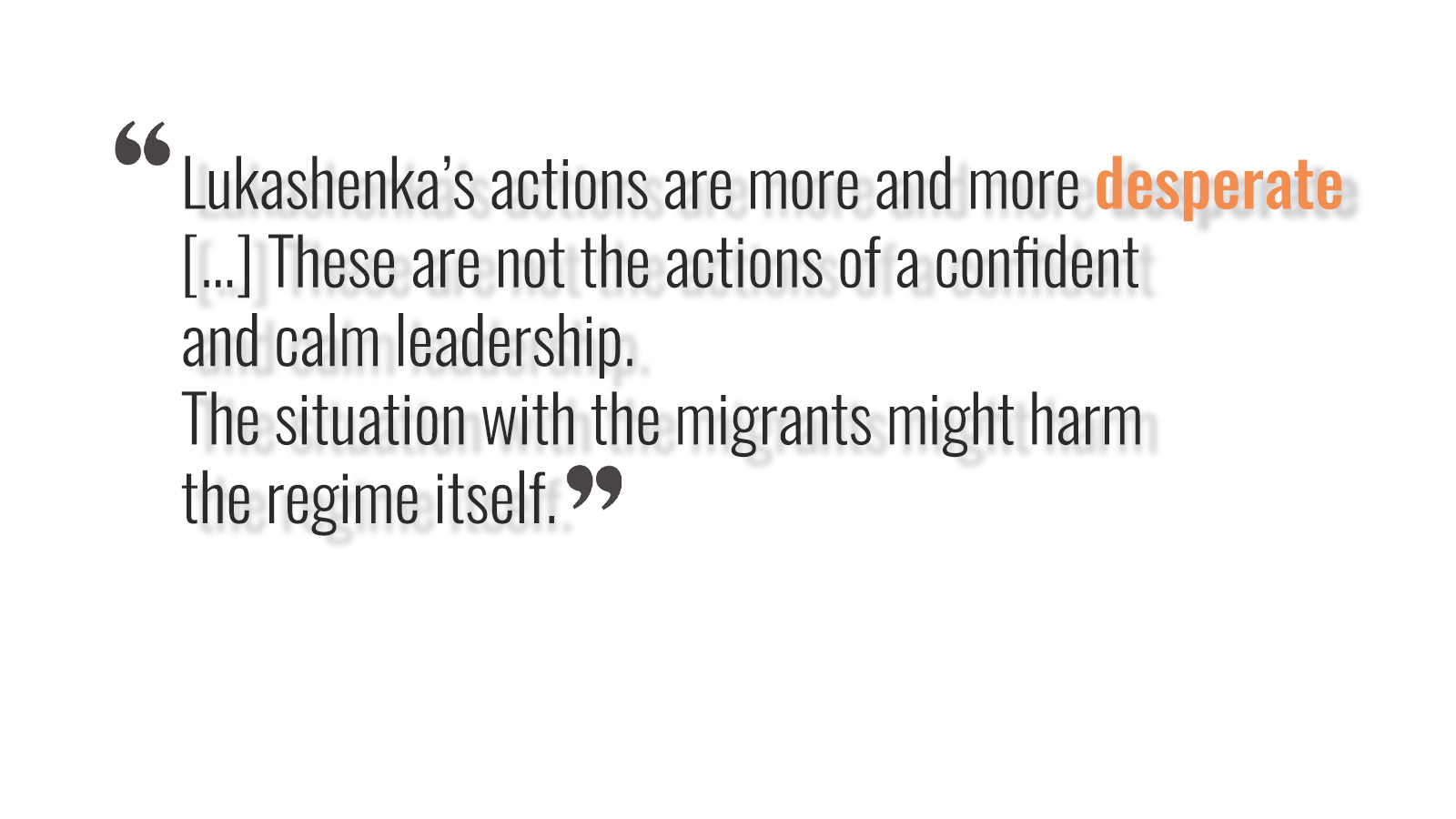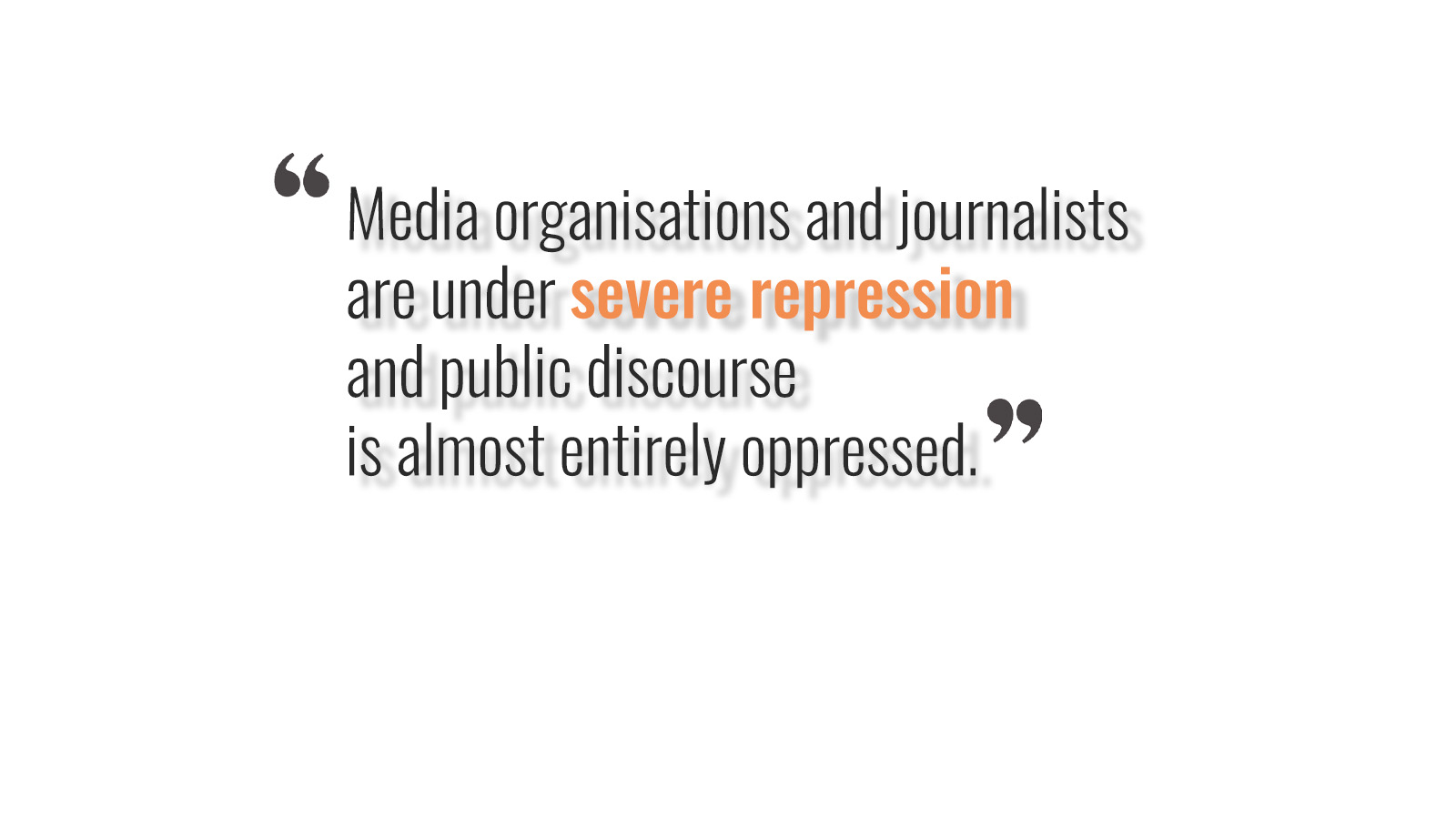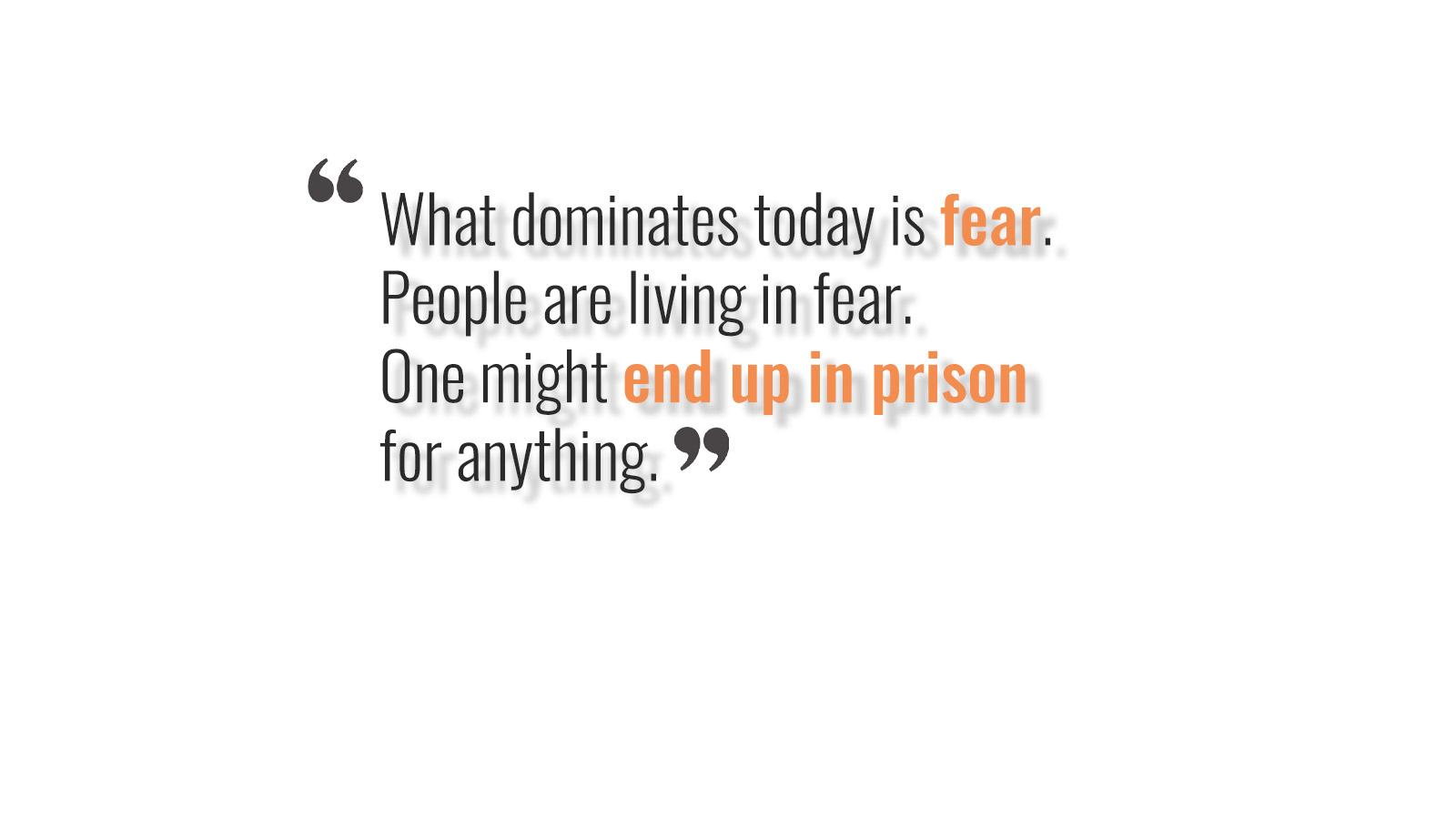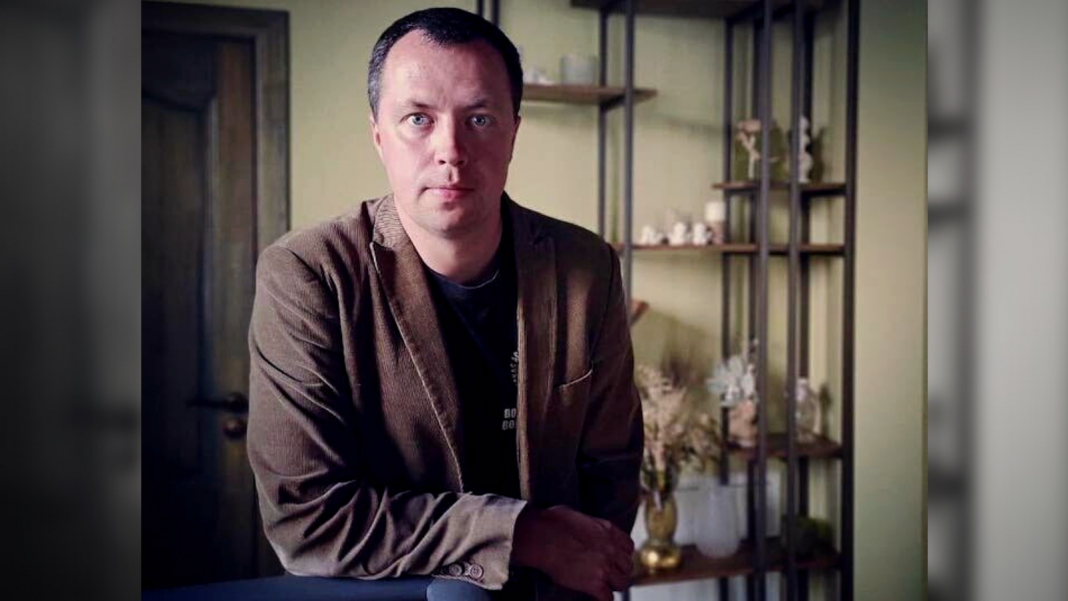An illegitimate president in panic forces the Belarusian people to live in fear. The repression is tightening, but the regime’s desperate actions bear witness to its weakness. We talked with Barys Haretski, vice president of the Belarusian Association of Journalists, currently in exile in Ukraine, about the state of public discourse and the future of independent voices in Belarus.
We must probably start with the current situation at the border with Poland and Lithuania: how do you assess it?
The Lukashenka regime feels the pressure from sanctions. The sanctions affect the Belarusian economy, the stability of the regime, and its wallet. The authorities have tried for around half a year to exploit the migrants, bringing in massive numbers from Iraq and other countries and having them storm the Polish and Lithuanian borders. One must remember that Europe has invested enormous amounts of money cooperating with Belarus in securing the borders. All our border check-points, the entirety of our borders with the EU, are built with EU money. So Lukashenka is sending a message: as Europe has introduced sanctions, the border is not going to function. He is doing everything to allow migrants to enter Europe.
What is your advice to the EU and EU member states on handling the situation?
If the EU should allow those migrants to enter, it would mean allowing this little dictator, who is currently holding over 800 political prisoners and has created hell in his own county, to blackmail and terrorise his neighbours. Today it’s migrants. Tomorrow it will be something else. Europe understands perfectly well that allowing the migrants to enter would mean a victory for Lukashenka. It would show that powerful Europe is unable to handle a tiny dictator like Lukashenka. I expect various types of provocations as next steps. There might be shots heard on the borders, migrants hurt. And the blame will be put on Polish border guards, despite the fact there is no way the Poles would do that. EU needs to remain calm and stick to its principles. If the EU should fall for this trap, there will be no end to it.

How is this situation described by Belarusian media?
The state propaganda outlets lay all blame on Poland and Lithuania, claiming that they caused this this situation. The state outlets are creating a narrative that Lithuania and Poland are obliged to let poor migrants in and that Poland and Lithuania are to blame for the migrants amassing along the border. Now the story is that the Poles have created a situation where children are dying from a lack of water in Belarusian forests. Independent Belarusian media have attempted, even before this acute phase of the situation, to report how the regime is exploiting the migrants.
What can be said about public discourse in Belarus?
Media organisations and journalists are under severe repression and public discourse is almost entirely oppressed. People are afraid of even leaving comments on the internet. Very few people are ready to risk expressing their views. An enormous number of people are behind bars, some for just leaving a comment [online]. We had an incident in Minsk a while ago, a shoot-out between security officials and a citizen. The officials broke into the home of a programmer who defended himself and was killed after killing an officer. Around 200 persons who commented on this incident were detained and are currently behind bars. Just for commenting. Public discourse is only possible on anonymous chats on Telegram. Here one might find very engaging discussions, and people dare to participate, as Telegram allows participants to be anonymous. If you are looking for public platforms for debate, those are very rare. People are too scared to express their views outside their own kitchens, or only anonymously on Telegram.
 This sounds very similar to Soviet times: what is similar, and what is different now?
This sounds very similar to Soviet times: what is similar, and what is different now?
It is hard to compare with the Soviet era. There was no internet at the time. And I doubt people were as scared back then. Obviously ‘The Soviet Era’ was not always the same. The 80s were not like the 70s or the 30s. What dominates today is fear. People are living in fear. One might end up in prison for anything. They see a sticker – you go to jail. I have acquaintances who rented a flat from a person who left the country after participating in the protests. They rented this flat and were living there until the security forces came. It is obvious that the tenants were not the ones the security forces were looking for, but once they had come, they still sentenced them to 15 days of prison. I suspect the fear is similar to what it could have been in 1937. But the situation really has no resemblance to the later Soviet era. The internet is still around, and even if you are not allowed to comment, you can still access information. The authorities attempt to block sites, but everything can be found on Telegram.

Your personal situation: what risks are your facing?
I have worked for ten years with the Belarusian Association of Journalists. Last year we worked intensively to support our members. We did not exclude the chance that our offices would be searched, but we were careful to follow the laws. We did not participate in the protests. We were strictly performing our legal functions and our charter. In February this year, our offices and the homes of most of the leaders of the Association were searched. Mine also. Security forces searched my home, confiscating documents, computers, cash. Most of us tried to stay in Belarus for some time, protesting the searches…
But from the spring of this year, the situation got worse. In July the authorities opened a large number of criminal cases. During a few days in July, over 100 journalists were subject to house searches. If at the beginning of the year, a handful of journalists were behind bars, accused of criminal felonies, in July there were 29. Our offices were searched a second time. Our colleagues devoted to work protecting citizen rights were detained July 14, and we decided to leave the country. We would have ended up in jail too, and that would have meant that we could not have done anything to help our colleagues. Our organisation was closed by the authorities. We were forbidden to work in Belarus. But we continue, of course, our work. A large number of Belarusian journalists are in exile in neighbouring countries, in Lithuania, Poland and Ukraine. We have offices in Kyiv, Vilnius, and Warsaw, in the countries where most exiled Belarusian journalists live. We continue to support our colleagues.
 How many of your Union’s members are in exile?
How many of your Union’s members are in exile?
We made a survey in October to establish how many were exiled. We have a rather good perception of the whereabouts of our members and have established formats for communication. We want to know what our members need. What they need in Kyiv, what they need in Vilnius… Currently around 300 of our members are in exile. The majority of our members are still in Belarus. Some do not work in current affairs, covering political news; some have stopped working in the media altogether. Recently, the authorities declared the channel Belsat, broadcasting from Poland, an ‘Extremist Entity’. It’s not merely the content that is ‘extremist’; a person with any connection to Belsat is charged with being connected to an ‘extremist entity’, and risks very serious consequences. So some of the colleagues still in Belarus were forced to stop working. Still, most of our members remain in Belarus and around 300 are in exile.
What are your recommendations to EU policymakers for supporting Belarusian public discourse?
The most important thing is to maintain the work of the independent media in Belarus. The regime does everything to exterminate or weaken independent outlets. The outlets need support, and it is necessary to establish programmes for supporting journalists. Long-term programmes for relocation of journalists forced into exile. We have access to short-term programmes to help journalists for a month or a few weeks in exile. For 2022, we understand that those in exile likely will have to stay abroad for a long time. They need housing. Either the outlets must receive support in order to be able to pay journalists enough to sustain a living in exile, or programmes [should be created] directly supporting individual journalists. Scholarships or something similar. It is important to maintain the Belarusian audience’s access to balanced information.

What gives you hope right now?
Everything will change, eventually. Sooner or later it will happen. 2022 will likely remain a hard year for us. With repressions, arrests… But the escalation of the repression really contains a source of hope. Lukashenka’s actions are more and more desperate. Maybe even the migration issue should be seen in this light. The actions are completely incomprehensible. If Lukashenka wanted to continue ruling the country, he would have no reason to create this kind of situation. These are not the actions of a confident and calm leadership. The situation with the migrants might harm the regime itself. Belarus again is at the centre of the world media’s attention, forcing the world community to react to the regime’s actions. All this contains an element of hope for change.





